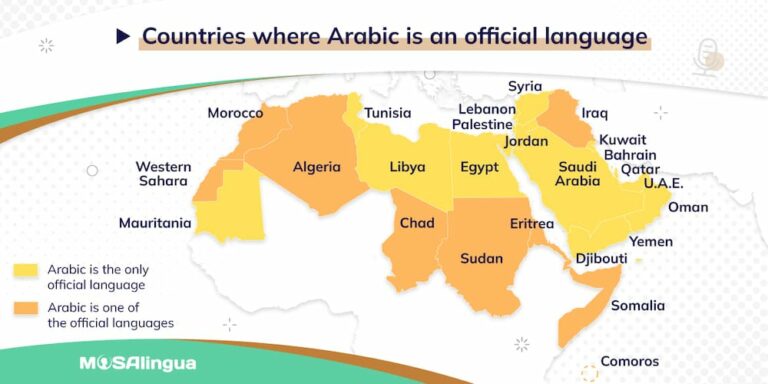Learning Arabic is something many people want to do. It is, after all, one of the most spoken languages in the world. Boasting more than 300 million speakers across the globe, Arabic is considered to be a universal language and is currently experiencing amazing growth. The Arabic language also has geopolitical, economic, and cultural influence in international relations. All of this is making this language increasingly important. And the more important a language is, the more interesting it is to learn! But, can you learn Arabic quickly? That’s exactly what I’ll be discussing in this article.

Is Learning Arabic Difficult?
Some people think this language sounds like gibberish simply due to the fact that it doesn’t sound like any Indo-European language. That makes them skeptical that quickly learning Arabic can be done. But researchers have debunked this myth. Research conducted by linguists shows that the process of learning Arabic is no different from any other language.
Memorizing Arabic vocabulary is an important step in learning this language. Many are those who encounter difficulties when trying to memorize the necessary lexicon for speaking this beautiful language.
However, highly efficient learning methods based on scientific research do exist. They are based on cognitive science and psychology and are freely available to anyone who wants to study this language. Such methods are great for quickly learning Arabic!
After taking a quick look at the current status of this magnificent language, I’ll describe some methods to apply to efficiently memorize Arabic vocabulary in record time.
A Look at the Arabic Language

The Arabic language is a Semitic, universal language and is thousands of years old. More than 300 million people speak it globally, and over 20 countries speak it as their official language. Arabic experienced massive growth when Islam spread to the four corners of the world. It’s currently expanding due to all the migrations and the strong presence of communities of Arabic origin in the Western world.
This language can be divided into two variations: Modern Standard Arabic (MSA), also called Literary or Standard Arabic, and dialectal Arabic, which includes many variations.
Modern Standard Arabic is the national and official language of the Arabic-speaking world. It’s the one that is used in literature, the media, administrative correspondence, etc.
Arabic dialects, in turn, are used in daily conversations. They are composed of words that come from various languages, but most of their words come from MSA—one could say it’s a patchwork of words.
And these two variations, MSA and dialectal Arabic, coexist in all Arabic-speaking countries.
How to Memorize Arabic Vocabulary Fast
Make use of a Spaced Repetition System (SRS)
In order to memorize 10-15 Arabic words a day, it’s indispensable to implement the Spaced Repetition System. This system allows learners to memorize words, concepts, and information for the long term by increasing the time between reviews.
To do this, you need to plan what you will learn according to the forgetting curve, which will allow you to review words in your frequency list you will have previously memorized just before you forget them. This way, you won’t waste time reviewing words you’re not about to forget anyway, and you won’t review words after you’ve completely forgotten them.
Learn Arabic faster with frequency lists
All languages spoken around the world have “basic words”, which are the most used words in daily conversation. To boost your level in Arabic and to successfully learn this language, I highly encourage you to memorize them.
For the Arabic language, you can easily find a list with, for example, 500 words. In other words, these are the 500 most used words in the Arabic language. This list is thus the ideal tool for quickly learning Arabic. This method of memorizing frequency lists is simply applying the Pareto Principle which states that 80% of effects come from 20% of causes.
Once you get hold of a frequency list of 500 words, you can memorize it within a month. All it takes is memorizing 15 words a day.
Note: many frequency lists exist, some organized by topic or context. Here are a few examples of such lists. You can first memorize the vocabulary for basic sentences, then the vocab for meeting new people, then for asking directions, and so on. Once you’ve chosen which vocabulary list you want to memorize, it is possible to quickly learn Arabic using a Spaced Repetition System.
Classify them into categories
One thing that you want to do when learning Arabic is to implement a technique for memorizing words with flashcards. The efficiency of this technique lies in the fact that using it means you will easily be able to recall the words you’ve memorized.
This technique makes use of active recall of which results are interesting, to say the least. With it, you can work on the pronunciation of Arabic words you want to learn. It leans very much on being able to answer questions asked and on entertainment. This technique is similar to putting sticky notes on objects around the house with their names in your target language. Active recall is among the most efficient methods for memorizing Arabic words.
Memorize phrases
Memorizing a frequency list with Arabic vocabulary is a very important and necessary step to reach fluency, but it’s not enough. In fact, learning isolated words is not sufficient for learning Arabic, or any language for that matter. To reach fluency, you need to put these words into phrases or full sentences in order to grasp how people actually use them. This enables you to use them adequately in a real conversation.
For this, you have to memorize ready-built phrases with words you already know. Just as there are frequency lists, there are sentence patterns: the most used phrases used in everyday conversations which can be memorized for learning Arabic in record time. Memorizing ready-built phrases will allow you to quickly use these phrases and adapt them to build more complicated ones.
This method for quickly learning Arabic by memorizing phrases can help you with a major problem many learners of the language encounter: not mastering grammar and conjugation rules. But between you and me, you don’t need to master all these rules to express yourself properly; not during the first months, at least. Memorizing ready-built phrases will be perfect for your level, initial goals and needs, thus bypassing the grammar rules beginners struggle so much with.
Go A Step Further
Once you’ve assimilated the language and memorized words and phrases, you can go further in your study of the language by concentrating on the alphabet and pronunciation.
Two ways to learn the alphabet
The Arabic alphabet has 28 letters. To efficiently learn this alphabet, it is of utmost importance to carefully listen to the vocalization of each letter. Looking for the equivalent of the Arabic letters in English could seem efficient, but it isn’t! And this is due to the fact that there are some letters in the Arabic alphabet of which sounds simply don’t exist in our language, as is the case for the letter ع.
The most efficient method to allow you—with some work—to pronounce the Arabic alphabet is to concentrate on two things:
-
Listen to the sounds
Carefully listen to the pronunciation of the Arabic letters in order to properly distinguish each letter and not confuse them (such as with the pronunciation of ذ and ز).
-
Work on correctly pronouncing all the letters of the Arabic alphabet
To do this, study the correct tongue and mouth position for each letter.
Another method consists of dividing the Arabic alphabet based on where they fall in the following categories:

- Letters that are pronounced lightly (such as ت [ta], س [si], ك [ka] , ذ [dha]) and those with a stronger pronunciation (such as Sa, with its “s” pronounced like the English word “sun”, ت [ta] and ق [qa], which is pronounced by pressing the throat, as opposed to the letter “ka”, of which sound originates from the mouth).
- The letters that can be attached to the right and the left, and those that can only be attached to the right. They are the following: أ [alif], د [da], ذ [dha], ر [raa] (rolled r), ز [zayn] and و [waw].
- Changing letters, and fixed letters. In Arabic, some letters change depending on whether they are at the end of a word or not. Some don’t change no matter their position.
I can’t advise you to do pronunciation exercises enough. They are very helpful for reproducing the correct sounds of the Arabic language. Especially those that don’t exist in English.
Why you shouldn’t learn the Arabic alphabet in order
I highly recommend that you don’t learn the Arabic alphabet in its traditional order. This can especially help you avoid amalgamates and other possible confusions between the letters with similar shapes and transcriptions but with different sounds. Only once you’ve learned all the letters of the Arabic alphabet should you learn their order.
One more thing: it’s important to write each letter properly so you can read it at a normal pace.
A Few More Tips
Here are some tips and tricks for optimally learning this beautiful language:
Don’t just learn its rules: learning should be contextualized. Learn things that you can easily use in practical contexts, such as at work or while shopping.
- Once again, make sure you do pronunciation exercises for words, phrases, and entire texts. This will help you properly and quickly express yourself.
- Learning Arabic must be dynamic! It’s very important to include fun activities, such as games, to better assimilate the language.
This article was written by Salim Kecir, a coach/tutor of the Arabic language for more than 15 years. He is also the author of books for learning Arabic, which you can find here (in French only). He also works for almodaris.com, teaching Arabic to students of all ages and levels.


 Don’t just learn its rules: learning should be contextualized. Learn things that you can easily use in practical contexts, such as at work or while shopping.
Don’t just learn its rules: learning should be contextualized. Learn things that you can easily use in practical contexts, such as at work or while shopping.


![How to Say No in English Without Sounding Rude [VIDEO]](https://www.mosalingua.com/en/files/2022/06/How-to-Say-No-in-English-300x150.jpg)
Thanks, that’s really helpful in learning Arabic
Its interesting…and i want to learn best arabic